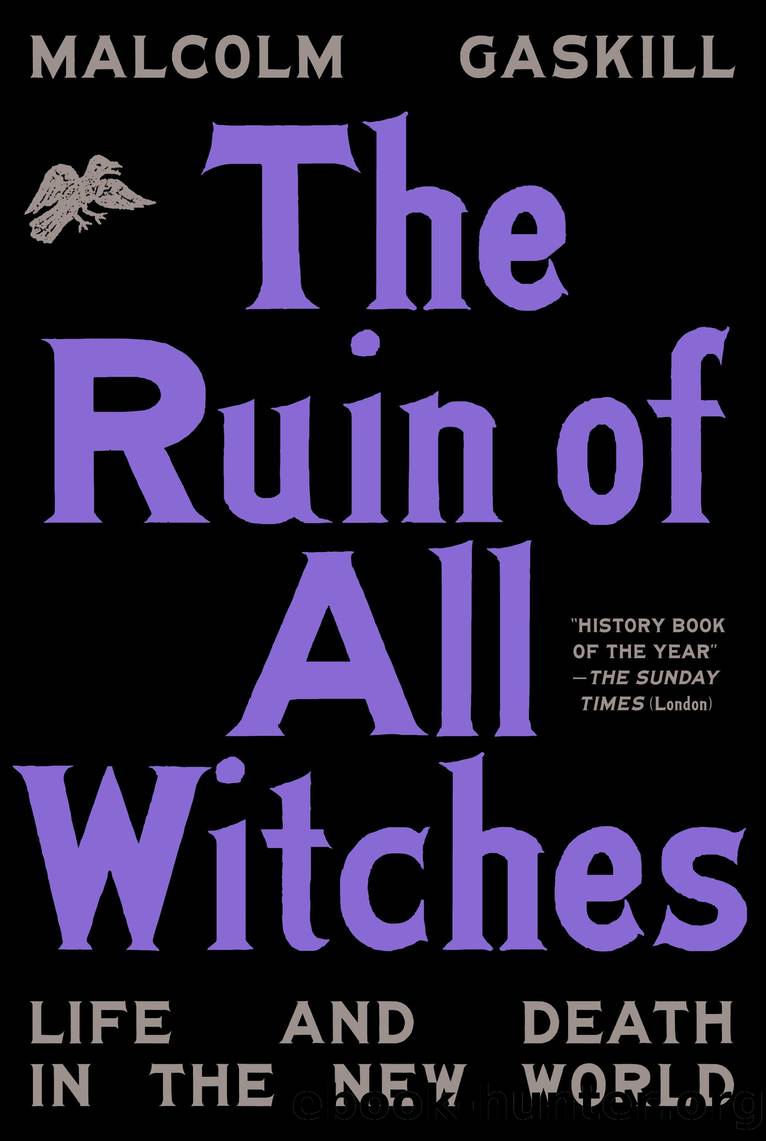The Ruin of All Witches by Malcolm Gaskill

Author:Malcolm Gaskill [Gaskill, Malcolm]
Language: eng
Format: epub
Publisher: Knopf Doubleday Publishing Group
Published: 2022-11-02T00:00:00+00:00
* * *
â
A rite of spring, traditionally marked with processions and dancing, May Day festivities had been suppressed in Old and New England as âa heathenish vanity, generally abused to superstition and wickedness.â[12] The devil had a stake in pagan idolatryâand besides, there were no holidays in the Bible. Better to use the time fighting Satan than flattering him. There was certainly no question of a celebration for Springfieldâs small, solemn band of witnesses when they arrived in Boston that week, although beneath their commitment to Christian duty lay an ebullition of vengeance. The early May skies were bright and clear, as William Pynchon and his party settled in lodgings near the courthouse. The prospect of testifying was nerve-racking, but Pynchon briefed them carefully as to what would be expected. His own thoughts flitted between the case against Hugh and Mary Parsons and the charge of heresy hanging over his head. He knew the timing was more than coincidence. To appear as both prosecutor and defendant in the same week was humiliating: a stratagem, no doubt, by the authorities to expose the impossibility of his own future in America.
Together the General Court and the Court of Assistants made up a two-tier trial and appeal tribunal for the Massachusetts Bay Colony: like a governing body with the powers of English courts combined.[13] The General Court had a mainly legislative function but heard appeals when the magistratesâthe Assistants, that isâfailed to agree or disagreed with juries.[14] Presumably because Mary Parsons had already confessed, her case went straight to the General Court, the spring session of which would commence at 8 a.m. on Thursday 8 May.
Early that morning, Pynchon guided Jonathan Taylor, Mercy Marshfield and the others through the already busy streets into the square between Treamont Street and Cornhill. Boston awed them as a metropolis of confidence and grandeurâand of varied sounds and smells and colorsâcompared to the more roughly hewn environment of Springfield. Nervous now, they passed the hulking prison where Hugh and Mary Parsons awaited their fate.
The courtroom was an intimidating place, with whitewashed walls and dark wood fixtures, equal parts majesty and misery. Facing the platform where witnesses appeared was the jury bench occupied by twelve freeholders of the city. Spectators crammed into the creaking gallery, alive with excitement at the prospect of the sensational hearing ahead. The clerk ordered âall riseâ; the noise subsided. Three judges, somber in black gowns and caps, entered the chamber and sat on their dais, the table before them stacked with papers and books. The chief justice was John Endecott, a West Countryman, who had succeeded John Winthrop as governor. Compared to Old England, New England relied less heavily on jurors, who, after all, lacked the magistrateâs special warrant from God to discover truth. Instead, more like inquisitors, they would inquire earnestly into the facts of character, relationship and event, and find guilt in the recesses of a defendantâs heart. The pressure to confess could be too much, all resistance broken by the promise of compassion for unburdened sinners.
Download
This site does not store any files on its server. We only index and link to content provided by other sites. Please contact the content providers to delete copyright contents if any and email us, we'll remove relevant links or contents immediately.
| African Americans | Civil War |
| Colonial Period | Immigrants |
| Revolution & Founding | State & Local |
Cat's cradle by Kurt Vonnegut(13896)
Pimp by Iceberg Slim(12947)
Underground: A Human History of the Worlds Beneath Our Feet by Will Hunt(11266)
4 3 2 1: A Novel by Paul Auster(11074)
The Radium Girls by Kate Moore(10917)
American History Stories, Volume III (Yesterday's Classics) by Pratt Mara L(4829)
Perfect Rhythm by Jae(4628)
Wiseguy by Nicholas Pileggi(4601)
The Fire Next Time by James Baldwin(4351)
Paper Towns by Green John(4178)
A Higher Loyalty: Truth, Lies, and Leadership by James Comey(4041)
Pale Blue Dot by Carl Sagan(4017)
The Mayflower and the Pilgrims' New World by Nathaniel Philbrick(3918)
The Doomsday Machine by Daniel Ellsberg(3738)
Too Much and Not the Mood by Durga Chew-Bose(3701)
Killers of the Flower Moon: The Osage Murders and the Birth of the FBI by David Grann(3623)
The Borden Murders by Sarah Miller(3596)
The Sympathizer by Viet Thanh Nguyen(3517)
Killing England by Bill O'Reilly(3461)
